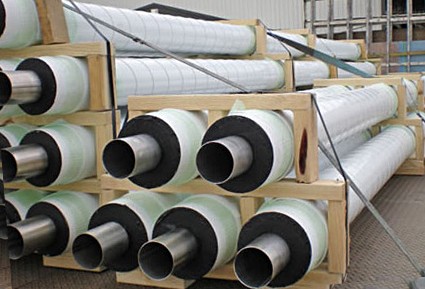PRE-INSULATED PIPING
 Pipe Insulation can be applied at the point of manufacture to which is known as pre-insulated piping, or insulation can be applied to pipes that have already been installed – on site application.
Pipe Insulation can be applied at the point of manufacture to which is known as pre-insulated piping, or insulation can be applied to pipes that have already been installed – on site application.
Pre-insulated Piping is manufactured in our Production Plant in Salisbury in South Australia. We are a major supplier of the Gips Pipes branded piping system.
With our corporate partners we can now produce approximately 1km of pipe a week, which is guaranteed top quality underground or above ground thanks to our new innovative centring systems.
The piping is available in most colours. Short run orders can be powder coated or if in large quantity we can provide a colour bond coat.
Using our spiral machine we can make casings to suit all Pre-Insulated Piping close purposes.
The use of high pressure pouring machine canon allows us to produce insulation which is 10% better value than product made with a low pressure machine.
All pipe leaving production at our facility is quality endorsed.
Reasons for Insulating Pipes
To Control Condensation
Pipes often operate at temperatures lower than the surrounding air. When warmer air comes into contact with the colder surface of the pipe it causes water vapour to condense on the pipe surface. Moisture contributes towards many different types of corrosion , so preventing condensation on pipework is important.
Pipe insulation is a good way to prevent this condensation, as the foam insulates the pipe from the surrounding air and the outside of the foam is maintained at air temperature. The insulation needs to contain a water vapour barrier and be sufficient to ensure the surface of the insulation exposed to air remains above the dew point temperature of the air it comes into contact with.
Reduce Risk of Pipes Freezing
Where pipes are located outside or in unheated areas where the temperature is likely to drop below freezing it is important to insulate pipes against the cold. When water freezes it expands and not only does this prevent the flow of water it can lead to damaged or burst pipes.
Although pipe insulation cannot prevent standing water from freezing in pipework, it can increase the time required for freezing to occur. So insulating pipework that is at risk of freezing is highly recommended. Local water-supply regulations may require pipe that pipes are insulated against the risk of freezing.
Water in a smaller-bore pipe will freeze more easily and more quickly than water in a larger-bore pipe. Since smaller-bore pipes present a greater risk of freezing, insulation is typically used in combination with alternative methods of freeze prevention such as modulating trace heating cable, or ensuring a consistent flow of water through the pipe.
Pipe Insulation is Energy Saving
Pipes carrying liquids that are above the temperature of the surrounding air (known as ambient Temperature) can cause heat to flow from the liquid into the cooler surrounding air, which is of course undesirable. It is therefore common practice to insulate these pipes against heat loss.
The thickness of the insulation required depends upon the temperature of the liquid being transferred in the pipe. The higher the temperature the thicker the insulation will need to be.
If pipes are located in a building that is itself well insulated it may not be necessary to insulate pipes as the heat loss may be minimal and heat being transferred to the air inside the building may be useful.
Protection against extreme temperatures
Where pipework is operating at extremely high or low temperatures, there is a high risk of serious injury for anyone coming into contact with the surface of the pipes.
Insulation pipes reduces the temperature of any surface that a person is likely to come into contact with and therefore reduces the risk of injury.
Noise Control
Foam insulation can form a high density sound barrier. Pipes running through a building can transmit noise from one part of a building to another, particularly where they pass through a wall of where there are physical fixings to walls or ceilings.
Insulating pipes reduces the transmission of sound, keeping the working environment quitter and more compliant.
CONTACT US
Save on energy costs this season with your home or business:
0428 112 559
A: 14 Frost Road,
Salisbury 5108
PRODUCTS & SERVICES
Please select from our range of products & services below. Call or email us for further inquiries.
